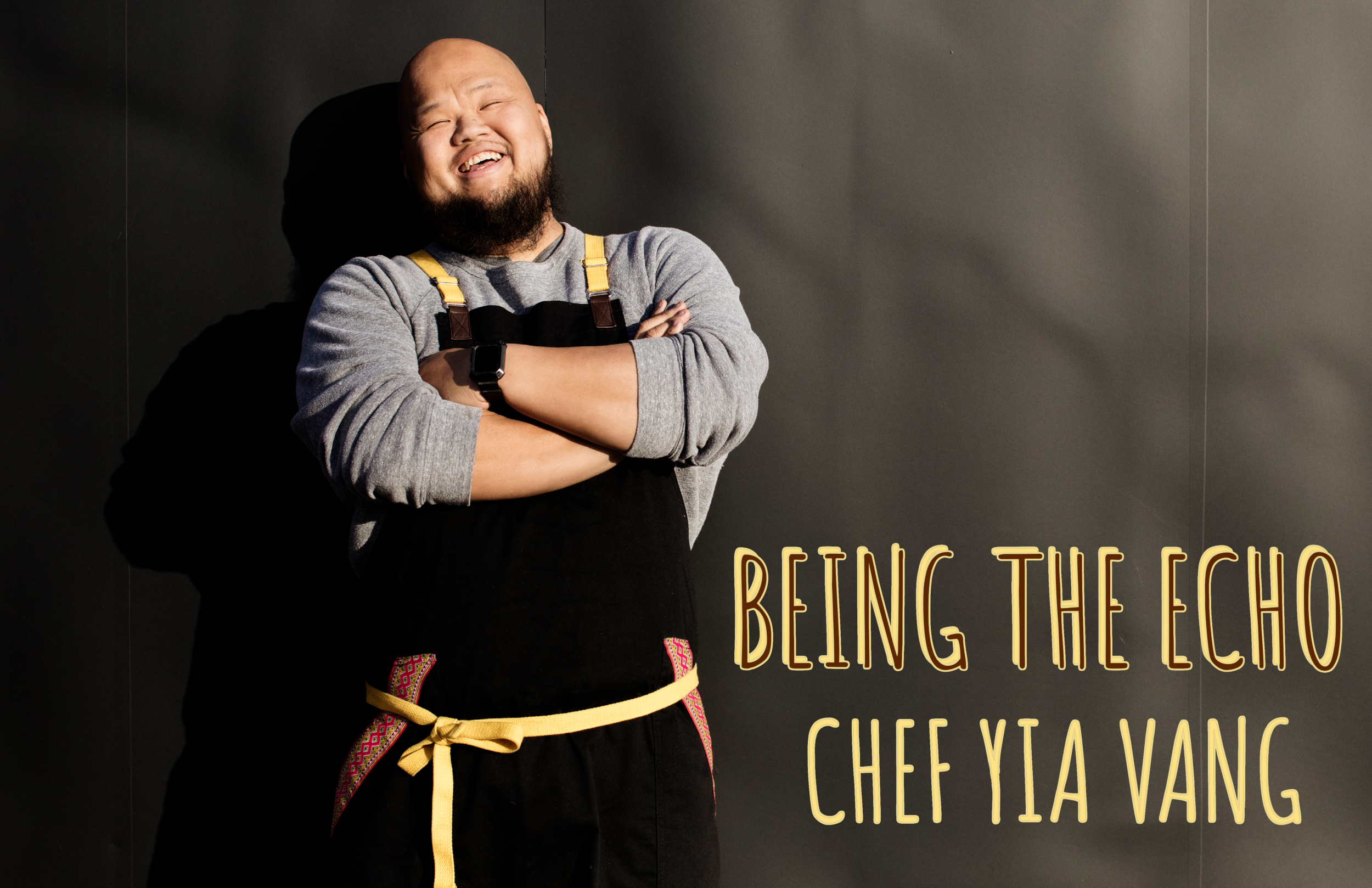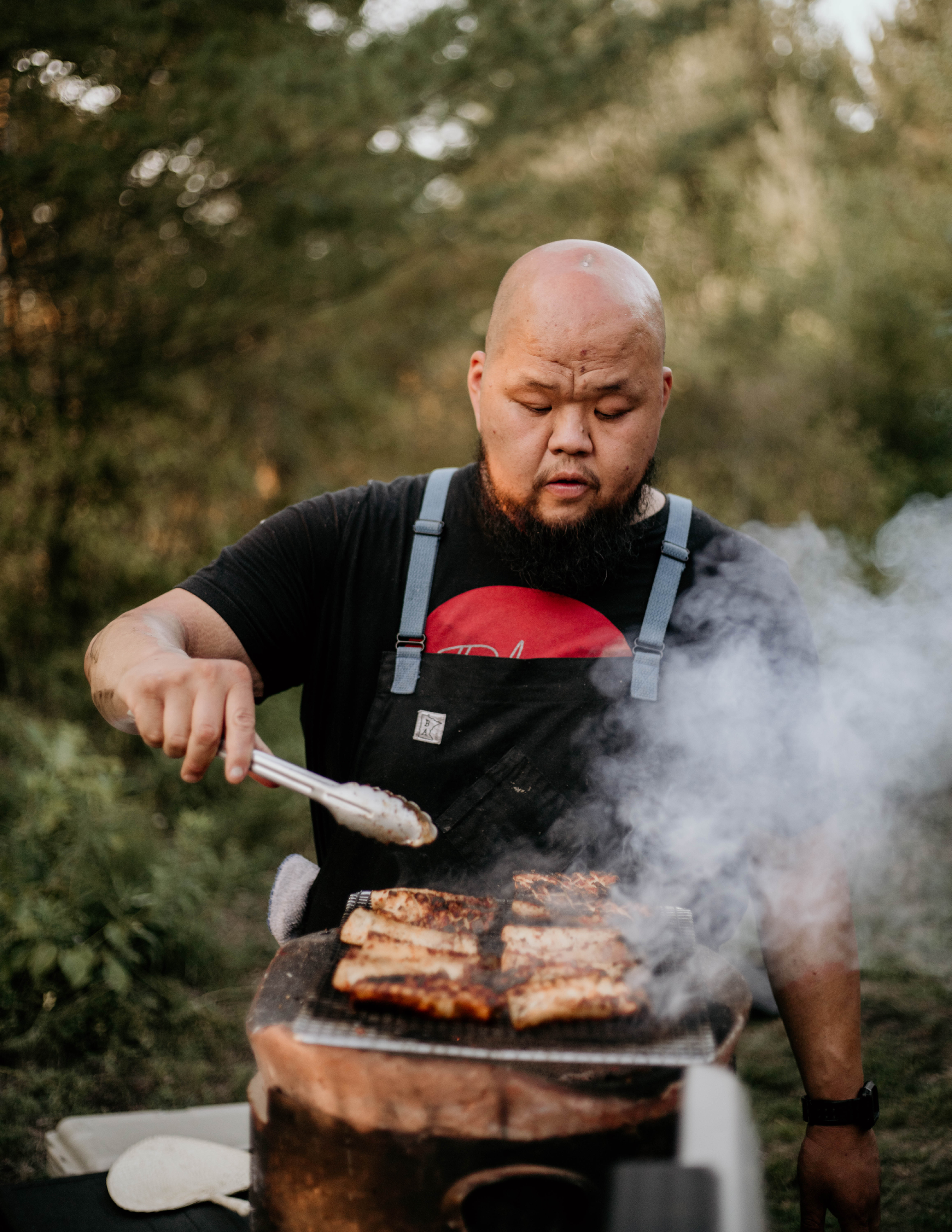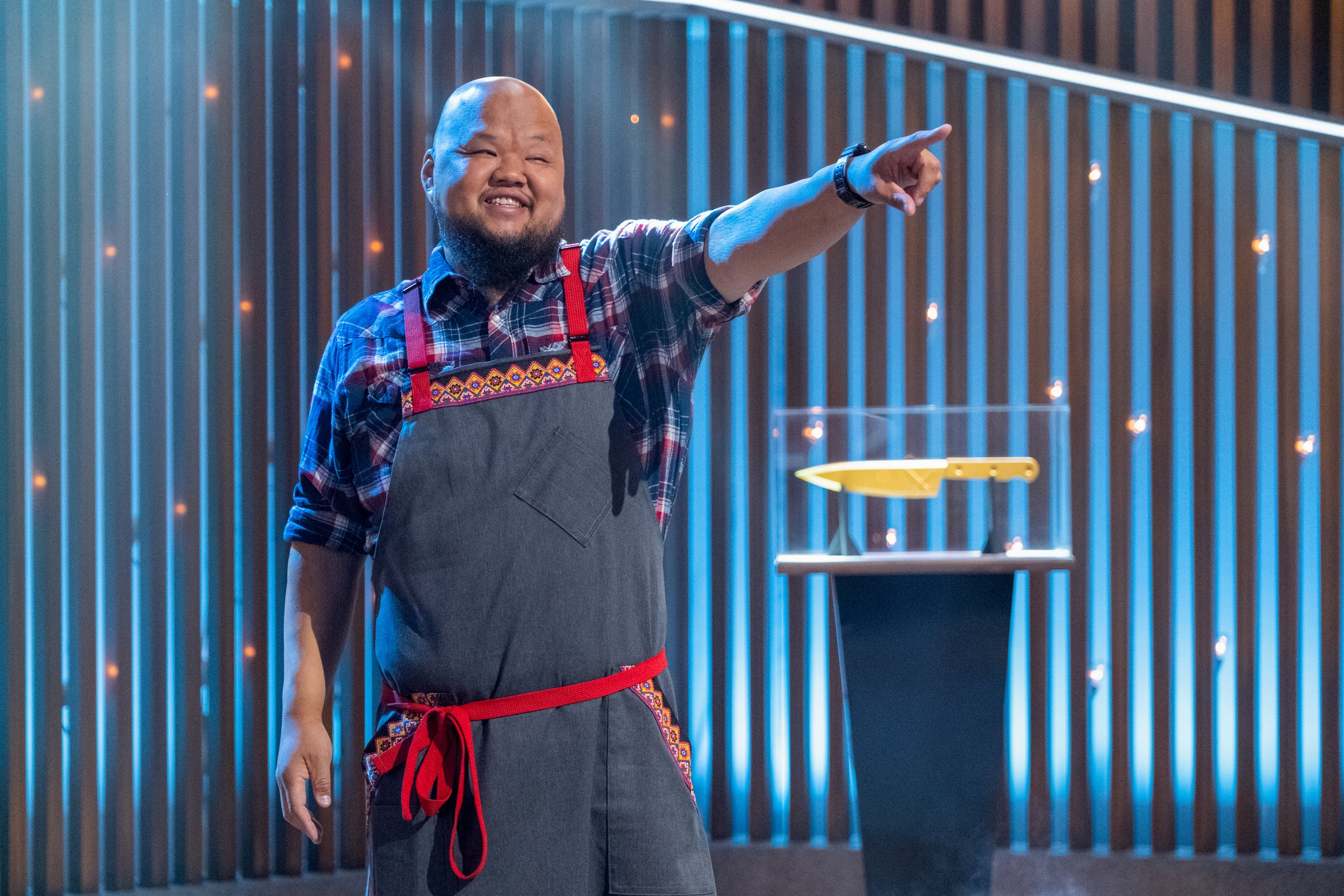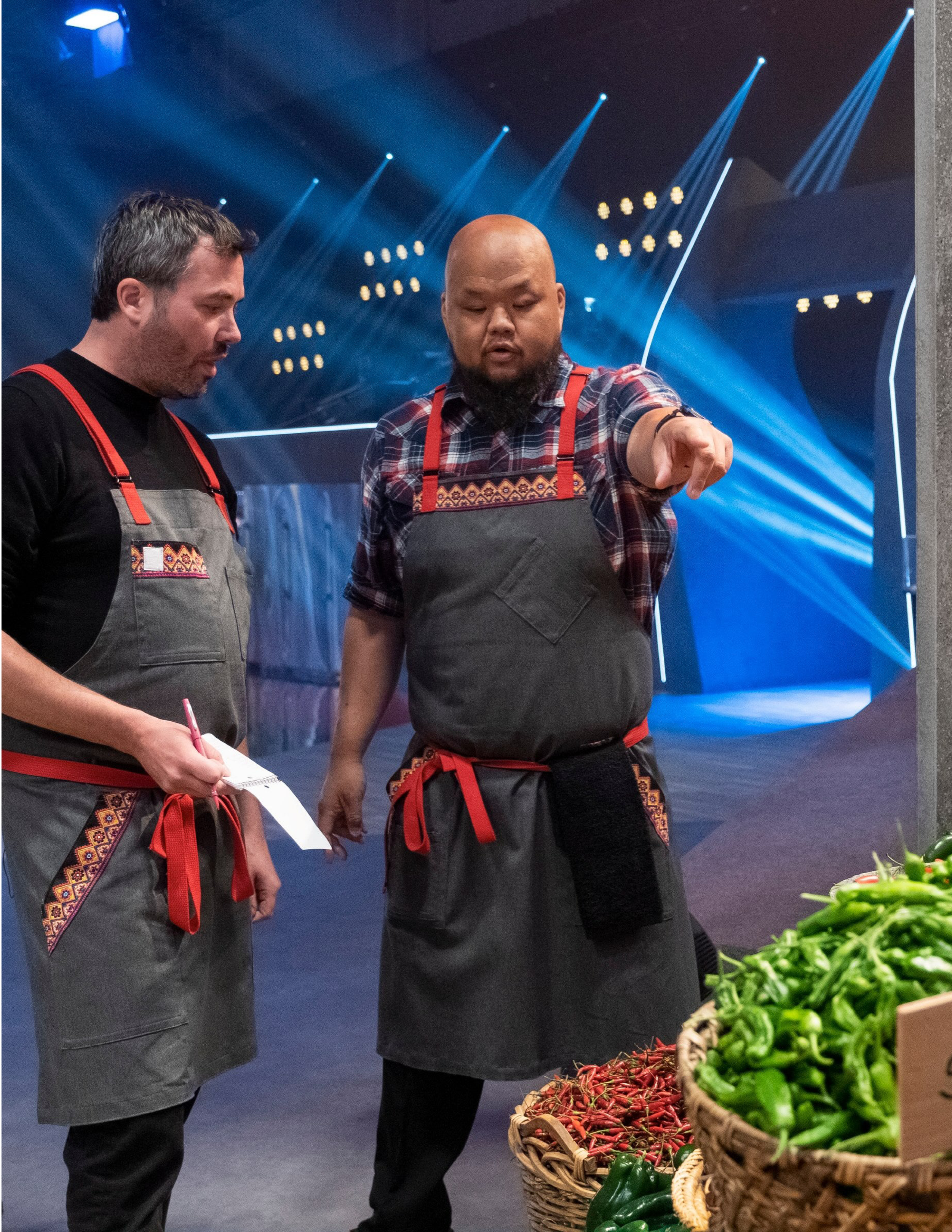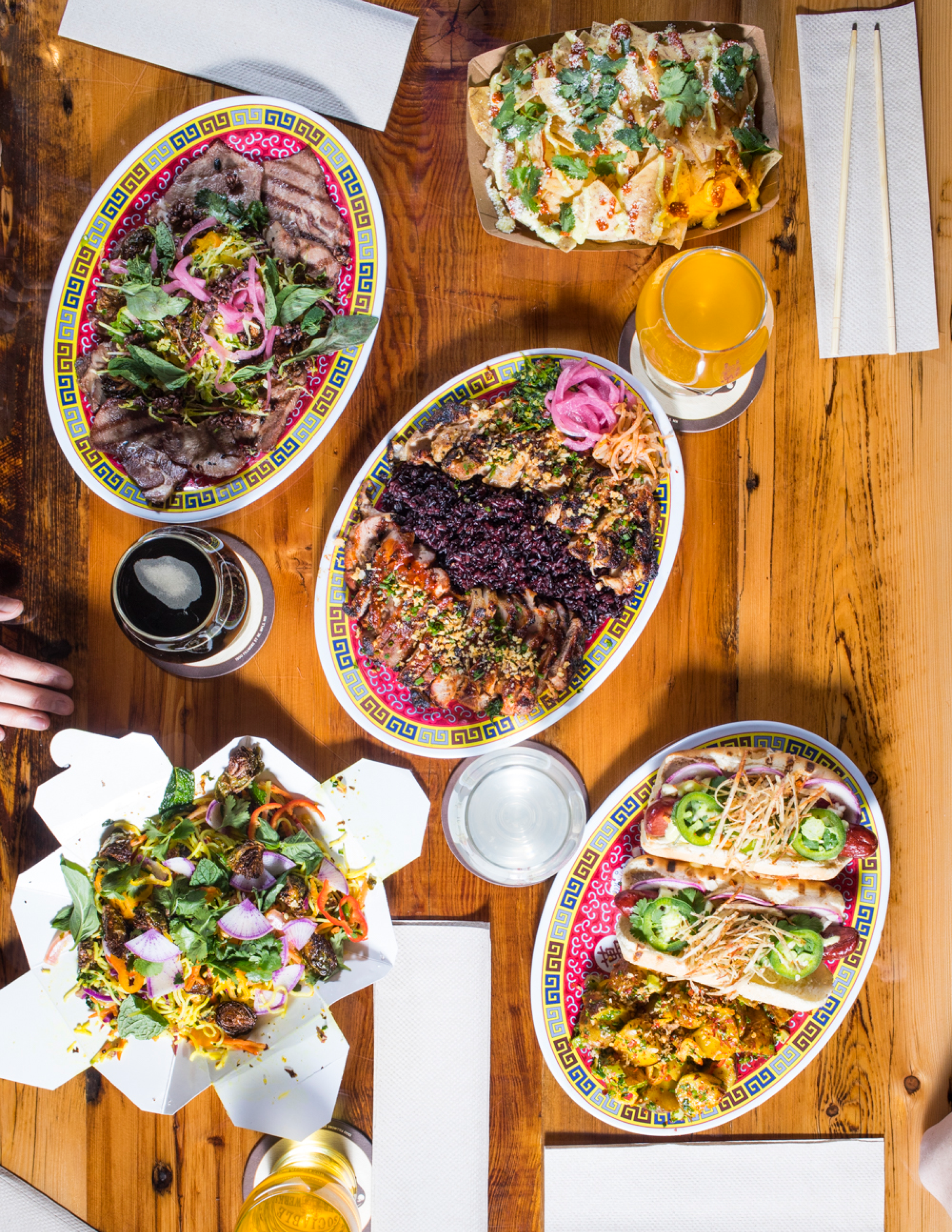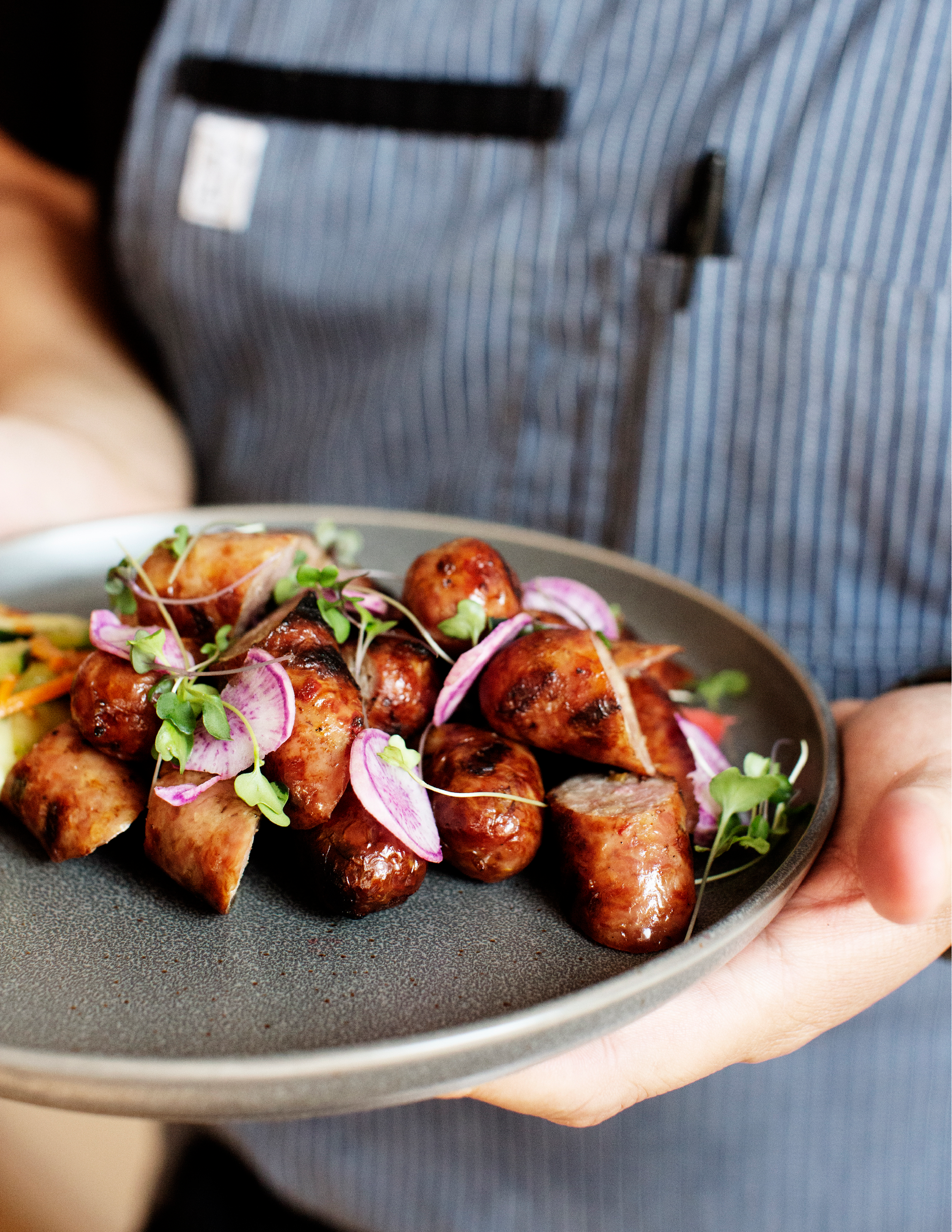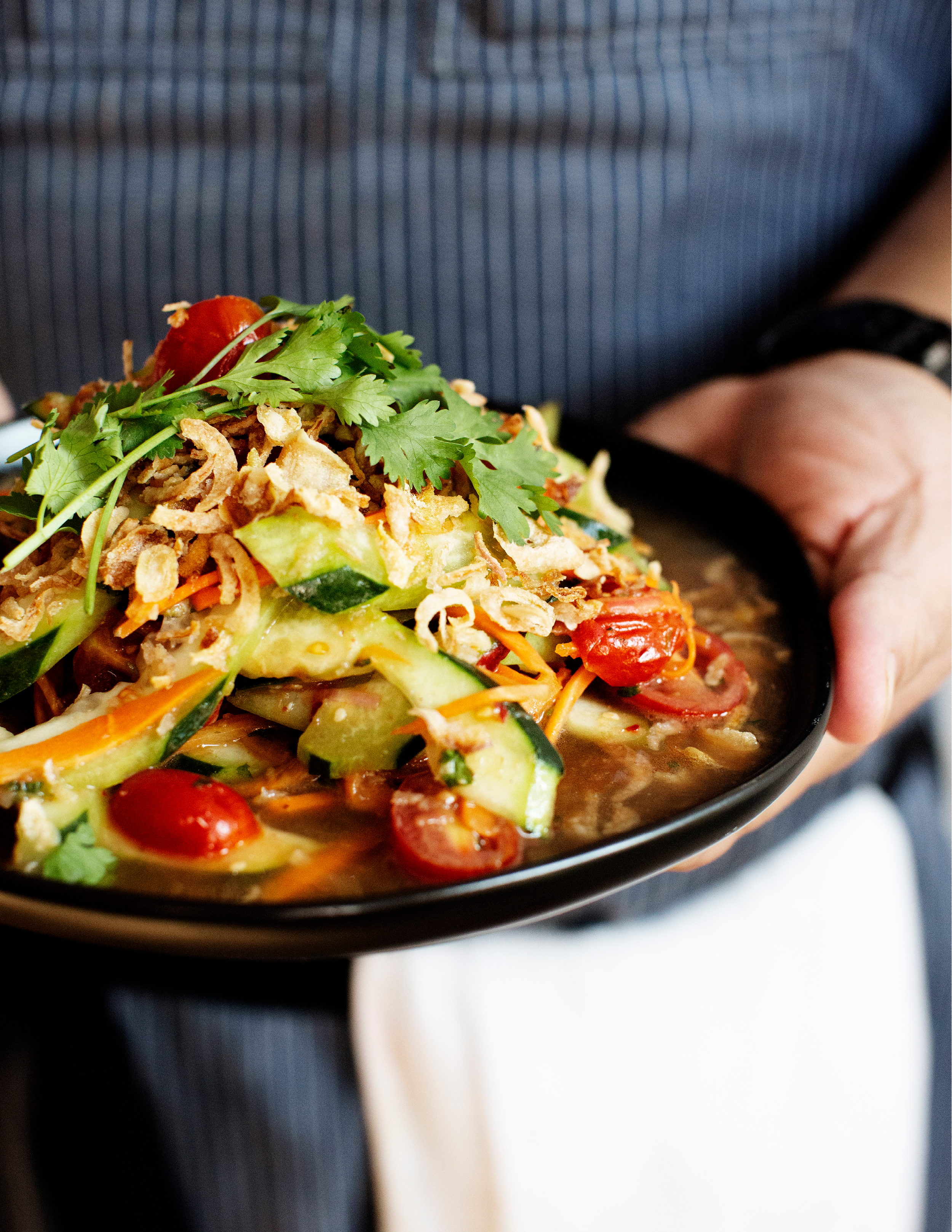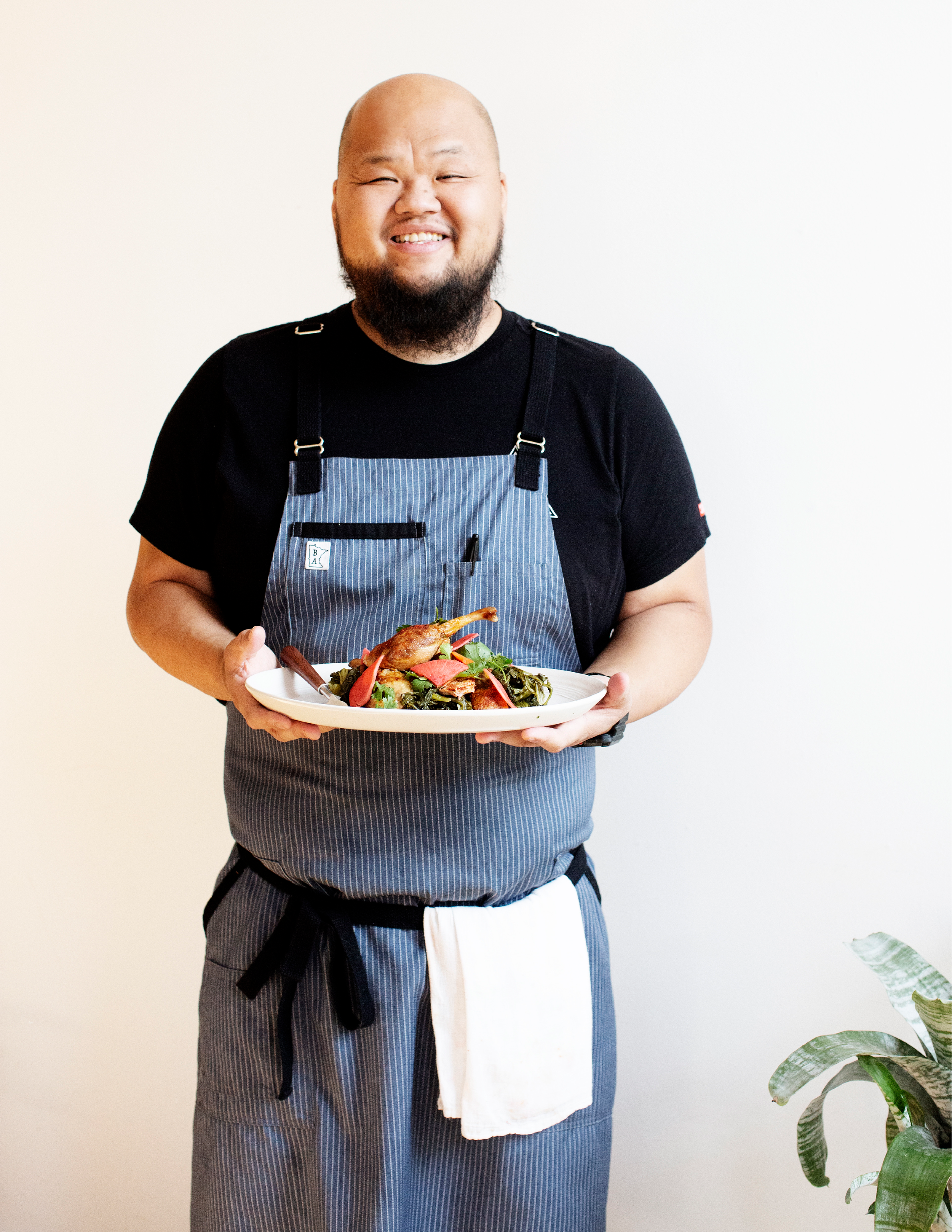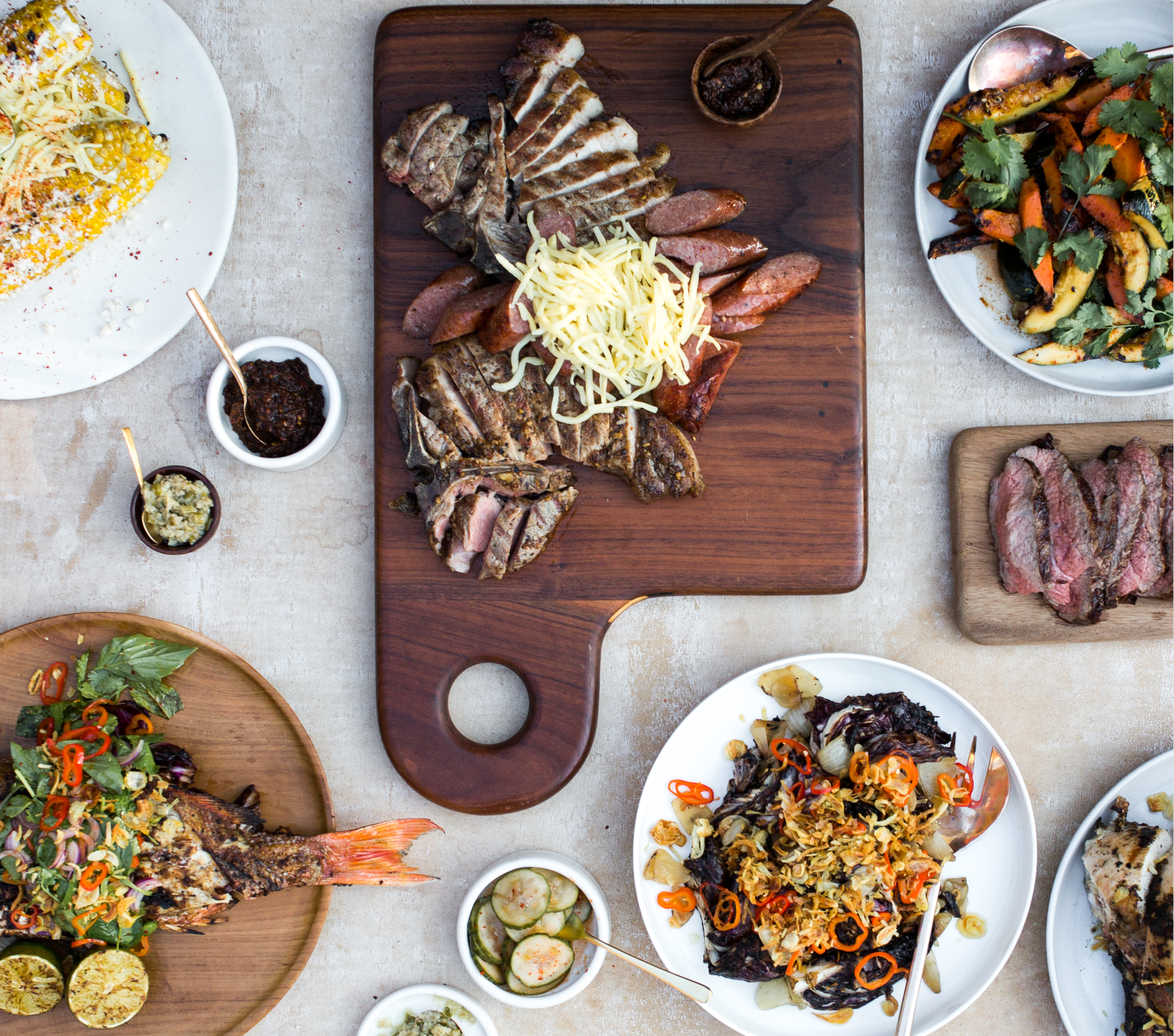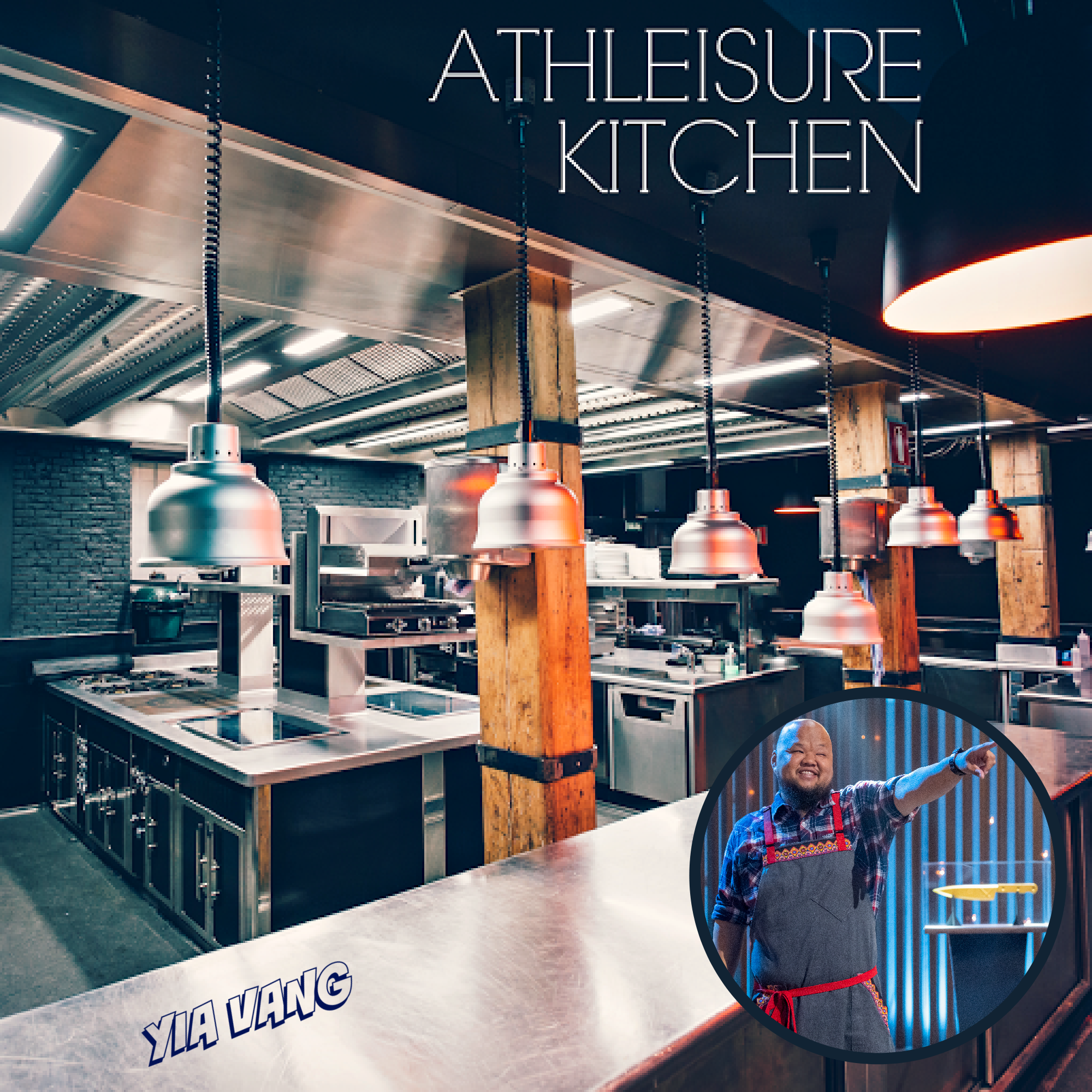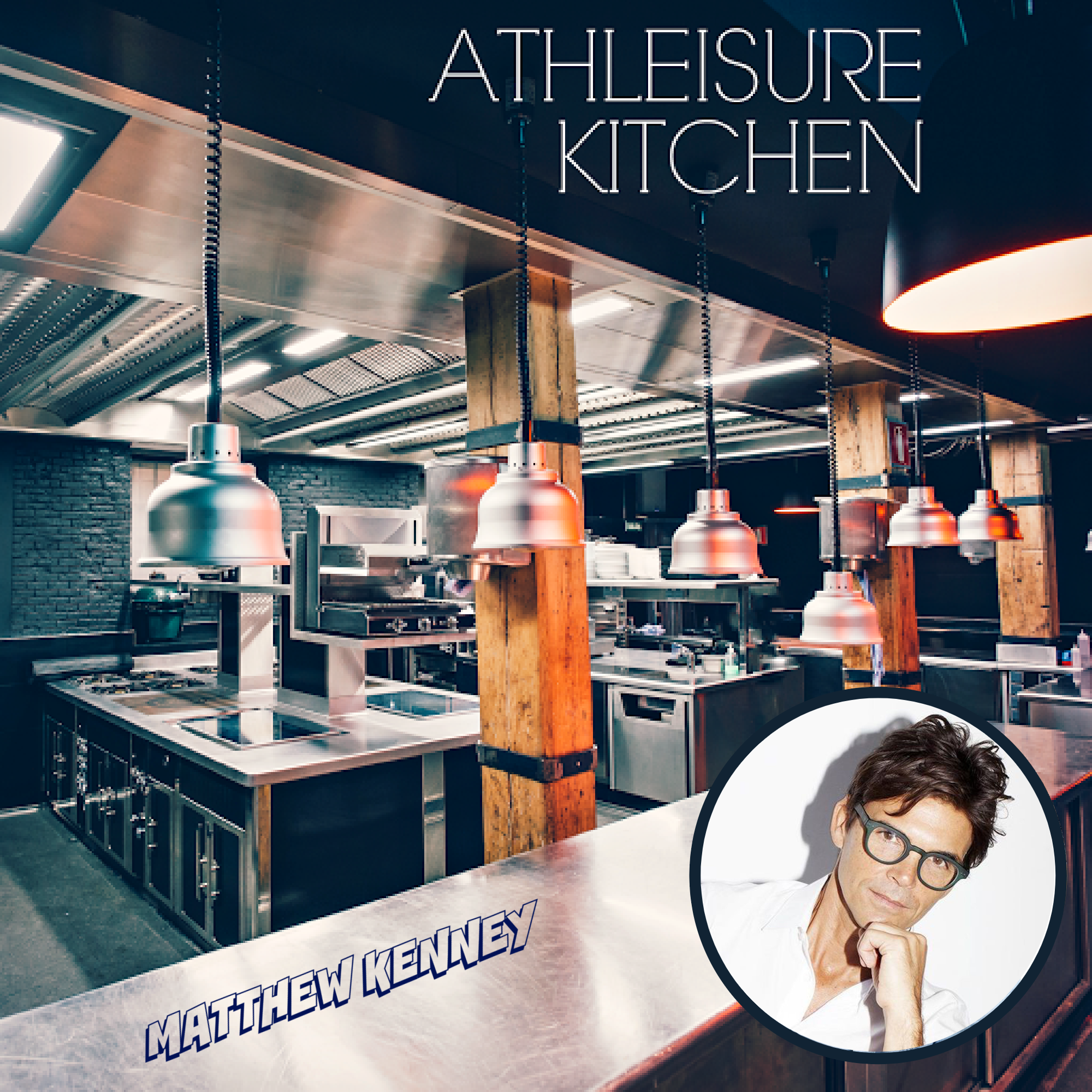There is something about a great meal that allows you to enjoy the flavors, the ambiance and so much more. When the food becomes a gateway to a deeper understanding about the people and culture, it's truly an immersive experience that leaves you with a bigger takeaway.
This month, we're pleased to sit down and chat with Chef Yia Vang, who infuses his passion for food by sharing his love for Hmong food, his parents as well as the people that it comes from. This multi-nominated James Beard Award chef whose restaurant is up for Best Chef: Midwest for a 2nd year in a row, has two restaurants in Minnesota, Union Hmong Kitchen and Vinai. He is also the host of Feral, competed on Iron Chef: Quest for An Iron Legend, hosts his podcast Hmonglish and more. He tells us about the food, his philosphy and the importance of representation.
ATHLEISURE MAG: When did you first fall in love with food?
CHEF YIA VANG: You know, food and I have a really weird relationship. If you say food in terms of kitchen cooking, I would say that kind of for me, it’s kind of like that high school sweetheart that you started dating and then said, “I don’t know man, I’m going to college and we’re kind of like different people right now.” So I did some other things and then we went through this really weird break up thing where we were together, broke up, and got back together and then like 15 years into it, I said, “I think that I kind of love you!” I might as well put a ring on it! Then, when I got into that mode where it’s like, “hey man, we’re each other’s kind of ride or die right now, huh?”
I always say that about 10 years ago, what happened for me was that I re-fell in love with my first love. I always knew that there was something about working in kitchens. It made sense to me and there was this thing inside of me that it made sense, I just didn’t know why. It took me awhile to figure out my why and once I figured out my why, everything connected and through the hard, the bad, the good, the ugly, and whatever, I knew that this thing made sense.
AM: At what point did you realize that you wanted to be a chef?
CHEF YV: I never – I don’t think that, see I was the dude that grew up saying, I don’t want to do this. I’m not trying to be you the guy who says, don’t give me that title. I really believe that titles are something that you earn and it’s something that is given to you, so I never went out claiming that I wanted to be a chef you know? I knew that I loved to cook, but again, it had to be more than just food and cooking for me. So for me, it was this idea of storytelling. My father is a great storyteller. We always as kids growing up – when he put us to bed or you know, when we would sit down, he would tell us Hmong legends and myths and he was really good at telling stories. So, I found myself as a kid, have you ever seen the movie Big Fish?
AM: I have!
CHEF YV: Yeah, you know how the whole movie, Billy Crudup’s (Jackie, Watchman, Almost Famous) character has weird issues with his father because of the stories that he tells and he doesn’t understand him. That was me growing up because I didn’t understand my father. As I got older, I realized that I am my father and as much as he is a primal storyteller, he can captivate an audience, that was also a part of me. Instead of using pen and paper, a typewriter or a computer, we get to use food as a canvas to tell stories.
AM: What was your journey in terms of where you trained or kitchens that you came up in to get to where you are today?
CHEF YV: I never knew that culinary school was a thing. I didn’t do that and I’m so glad that I didn’t do that. For some people it works! We have chefs that work with us who came from culinary school and they’re incredible you know? I’m one of those people that if my hand touches it, then I can understand it. If I understand how the concept works, then I will be able to do it. My dad, he doesn’t understand English but if you give him a table, he can look at it and reverse engineer it in his brain and he can build it. So for me, that's how I work also. It was just me working in kitchens and I was so young when I started that I was too dumb to realize that what I was doing here, that was very hard. I was just working on my feet for 12 hours and felt that that was what everyone did. I know that I had a sense of what was “kitchen culture,” when I first started, 20 years ago it was like, “hey kid, you just go and you just earn your spot.” Because, that’s just what you do. Don’t try to talk about how you feel. I worked in a lot of kitchens and again, while I was doing it, I never thought that I would actually be doing this. I felt that that was a job, I was doing it at that point to get to the next bigger and better thing.
AM: In preparation in speaking with you, I like reading that you said, that for you, cooking is about intention and interpretation and that that came from your background as a communications major at University of Wisconsin – La Crosse. That struck a chord with me as I was a Telecommunications major at Indiana University and I got that! Can you tell me what you meant by that?
CHEF YV: Again, my first goal in college when I got in, all I cared about and I was kind of a gym rat. I wanted to play football and I wanted to play college football. That meant that you had to be an Exercise & Sports major or you had to be a Science Teacher. Right when I got into Biochem, I was like, “dang this is too hard!” So, I literally changed majors a couple of times and I ended up with communications. In my first class, the professor asked, “what is more important? The interpretation of the message or the intention of the message?” We had this big discussion and she gave us this study and we read that 70% of the people based on this qualitative and quantitative study said that the interpretation of the message is more important than the intention of the message. So as cooks, when we’re cooking food, I can say, “oh yeah, this is what my intention is and this and this.” I want to do it this way, because it should be eaten this way. But if the interpretation of the message isn’t interpreted like that, I think that as cooks, we need to readjust ourselves. That doesn’t mean that we’re changing our values and beliefs in what we’re doing, but we have to say, how do we get the message across? In communication, communication is not a monologue. It's a dialogue between 2 people. So, if I am trying to explain something to someone and they’re not getting it. I have to ask myself, “what do I need to adjust on my end?” I think that we live now and the pendulum swings right? It started with the customer is always right. I think that the pendulum swung to that side and then there’s a whole group of chefs who are like, “F- you! The customer is not always right, and we need to explain our intentionality.” Now, it has swung to the other side and what we’re doing is we’re having guests who are dining with us and they don’t get the food. They pretend that they do because you have to look good in social media. So that’s why for us, that’s why I say, “hey, there’s a happy medium over here.” I want to talk about Hmong food. What makes Hmong food, Hmong food? Even Hmong people, we can’t make a decision and be consistent on what is Hmong food. If our own people can’t figure out what it is, how are cultures from the outside going to be able to figure it out? So for the last 7 years, we have had the pleasure – I call it the pleasure, the pain, and the everything to try to say how do we create guard rails, not rules and guidelines around Hmong food. So yeah, it’s been a pleasure in being able to do that.
AM: It’s great that you said it like that because when I interview chefs that are known for Mediterranean cuisine, Italian, French etc. I will ask questions that focus on foods, ingredients and tastes that are indicative of those culinary styles. But again, in watching your videos and hearing you talk about this food and how you see it, you say that Hmong food is a philosophy, and it involves the people that are woven into the food. That is such a great concept. How important are the people to the food in your opinion?
CHEF YV: It is the most important thing. Our food is our people and our people is our food! When you get a group of people that doesn’t have a home and doesn’t have a country of their own, and they don’t have any kind of “marks of identity,” what they do is gather around food.
Because if you think about food, food is so core to survival right? It’s that thing that keeps us alive. Well of course what keeps us alive and is so core to our survival is the closest things to our hearts. It is for us, the way that we think about food, it’s the same way that some people think about their family. They think about the people that are the closest to them.
You know, when my parents came to America, they had to change the way that they cooked because cooking in the mountains of Laos over woodfire, pots and pans in huts made out of tree barks and bamboo, is different than cooking in a duplex apartment in Wisconsin, you know?
AM: Right!
CHEF YV: They had to change and they had to adapt and to survive the way they did things. The reason why is that they had to raise and take care of their kids! As a kid who’s 5 years old who comes to America and then I eat the food that my mom and dad cooks here in the United States and of course it’s going to be different than where they’re from and have a different flavor and taste! But the heart of it is still the same! What we love talking about is the food that we grew up with is Hmong food because it’s made by Hmong people. It’s Hmong food because it’s touched by Hmong hands. Our people if you can see back from generation to generation, it’s about survival and for the first time, my generation, my group of people as I’m 38, those of us that are here now, all the millennials that are the Hmong kids, this is the first time in a long long time in our history, that we don’t have to worry about uprooting and constantly having to move. We don’t have to worry about war and we don’t have to worry about death. When you have a civilization that doesn’t have to worry about that, they have the ability to grow, to dream and to imagine. They have the ability to wonder. I was just joking with a friend this morning and I told him that I felt like Moana from Disney! I can wonder beyond the reef! I feel like I can ask those questions like mom and dad, what’s beyond the reef? Because everything that I have known is in the reef, but now we’re one of the first generations like myself and my nieces and nephews and those that are younger, they can wonder and talk to themselves and think about this idea of wanting to be an architect – what’s an architect? I want to go into finance, what's finance? All of these things are completely different and it's a whole new world! The reason that we can do that is off the backs of mom and dad who cooked this food for us. I’ll be damned if I look at that and say, “well, I’m going to make a twist on it.” How dare I make a twist on anything? I get to add on to what they do. So that’s the way that I think of Hmong food and that’s the way that we can challenge the way that people think of it. We get a lot of push back here and there. But the truth of the matter is, I think that that is food generally. Isn’t that what it’s about?
We have a big family! So there is that thing of wanting to have something better and being able to sacrifice for it. It’s the same thing that our parents did for us. It’s great that we pay an homage to the old school stuff. I think it’s amazing and I do that all of the time. But to say that this is how we have to be – no, that’s how a civilization or a group of people remain stagnant. We live in a world of advancing forward. For our food company, we always say that our core DNA, our core functional values are 3 words are “moving forward together.”
We got those words and are inspired by them because of my mom and dad’s journey escaping Laos after the war.
My dad always said that as a group of people that lived in the jungle for months and months to escape the murders, the genocide as a group, we always had to keep moving forward together. Move forward together.
The question of why are there melting pots all through the Midwest?
AM: Yup!
CHEF YV: Like go to Dearborn, Michigan. There is a huge Muslim population there. Like Dearborn? Dude, they didn’t go to Dearborn, Michigan because of the weather. St. Paul, Minneapolis, has the largest Hmong population. We didn’t come here because we love the winter. We’re from the hills where it’s sunny and muggy, here it’s -30˚ for 5 months!
We didn’t do that, it was survival! In that connection of survival, especially with food, it connects our humanity together. As much as we are different, we’re not that different. That’s what we choose to tap into. In a society and a world that’s all about the pendulum’s swing where it’s let’s all the be the same or we can’t all be the same – that pendulum continues to swing back and forth to create that dichotomy in this country. I say, “hey, we are different, but we’re not that different.” We can share that with Hmong food. We don’t have to wait for a culture to dub us worthy or to hear our stories. No, we have our stories and if you allow us a little corner of the stage, allow us a little corner of a soapbox, we want to tell you that story.
AM: We have spent the last 2 years trying to get an interview with you because of everything we've seen about you on TV and although we have yet to go to your corner of the world to eat at your restaurants personally, We love the messaging and awareness that you do through your food. It’s an honor to be talking with you right now.
CHEF YV: Thank you so much! That means so much! At the end of the day, I have these college buddies of mine and we’re so tight and they always ask, how do you keep it together and I’m like, “I don’t know, I hang out with you idiots!” I tell them that they keep reminding me that I’m just a Wisconsin boy that still doesn’t really know what he’s doing. I love that you know? I love going home and my mom – I remember the first year that we got our first James Beard Award nomination and I was so excited and told her. She was like, “that’s nice honey. Just take the trash out when you leave.”
AM: Haha well that’s the Midwest in us!
CHEF YV: Oh yeah, that is! I remember last year when we were finalists and I was explaining to my mom what it is and she was like, “oh, does everyone in Minnesota get one of these?” And I’m like, yeah, yeah mom sure haha! It’s like bless her heart you know? I feel very very honored to be here and to be able to do all of these things, the TV and it’s such an honor to be part of all of these things.
AM: You’re the chef/owner of Union Hmong Kitchen. Like you said, it was a James Beard Award nominated semifinalist, tell me about this restaurant and what are 3 dishes that we should try on our next visit?
CHEF YV: For sure, we have all of these things going on and we’re very blessed that Union Hmong Kitchen started as this tiny little pop up tent thing at Farmer’s Markets. We always say that Hmong food consists of 4 elements. We don’t say that Union Hmong Kitchen is authentic Hmong food. We don’t say that. It’s a gateway to understanding our people and our food. So we always have the following. Think of meats and three. We always talk about that. It’s the best way to communicate with people especially Southerners when you’re talking about meats and three.
So Hmong food consists of 4 elements. There’s a protein, there’s some kind of rice – it’s either jasmine rice, sticky rice and then you have some kind of vegetable. Sometimes our vegetable is in a broth or sometimes it’s just a vegetable. The 4th element is a hot sauce and there has to be a hot sauce. So when you come to Union Hmong Kitchen, that’s what you’re going to get. You get to pick your meat – your protein and you have your sticky rice – we have purple sticky rice which is historically connected to Hmong people and then you pick a vegetable side. Sometimes it’s a noodle or straight up right now it’s Brussel Sprouts or something and we’ll change it up since Spring is coming. Then we have a couple of different hot sauces that we traditionally grew up eating. So it’s meat and threes, it’s dealers choice.
What we’re very proud of is the Hmong sausage that we created. It is a recipe that my dad showed me growing up. It wasn’t like he taught it to me. He made it and I watched. As I grew older, I would say, “hey dad, can we try that?” We won a couple of awards with it and it’s funny. Again, I told my dad, I mean we’re from the Midwest so you have all of these sausages since it’s sausage central and I said we won it with the Hmong sausage that he created. I brought the trophy to my dad and he was like, “really they liked that silly recipe?” I was like, well this is in your honor I guess! To me, that’s a very very special thing. It’s part of dad’s legacy. We’re to the point with that where a really great Eastern European sausage company, they now make this for us with our recipe. It’s the coolest thing ever to see a Hmong recipe being made in a Ukrainian family which is almost a 70 years old company here.
AM: Oh wow!
CHEF YV: Yeah, you know what I’m saying? How amazing is that?
Nick, the son who is the owner, he’s just like, this is one of our best sellers here. A Ukrainian family making a Hmong sausage which they love themselves using and now it’s in Twin Stadium and now we’re trying to get it out to local shops and stuff like that.
AM: That’s really cool.
CHEF YV: Exactly, so me and Nick are talking together and with everything going on in Ukraine – all the refugees in Ukraine and all the war in Ukraine. I’m talking to him and I understand that as a kid who is a refugee and comes from war too. It’s different parts of the world and yet again, we’re very different, but we’re not different.
That was a tangent but yes, we have Hmong sausage and we worked very hard on our pork belly. Obviously, we have the chicken, and our tofu is good as well! Again, I don’t want to say, these are our 3 dishes, just come in – but we do have what we call the Graze Feast! For me, it came from when we were very poor in college. But when all of the dudes scraped all of our money together, we would pitch in and we would go to Famous Dave’s and we would get the Trash Can Lid BBQ. Do you know what I’m talking about?
AM: Yeah I have had friends who went there!
CHEF YV: Yeah so basically, you get the highlights of the menu on a trash can lid and Famous Dave’s still has that. So this is an homage to that and we call it the Graze Feast. It’s served on a bamboo rice basket. We lay it out on a banana leaf and we put everything on it and it’s like the best of both worlds. If you’re 4 people, I tell them to get it because it is the bang for the buck. You get the whole tour and secondly, you also get a whole fried fish on there too. We have a fried Bronzino fish that we throw on there and that’s another mom and dad classic. My mom loves cooking a whole fish and deep frying and grilling it for dad. Dad just sits there and lives his best life now. His favorite thing that he loves to do when he has the whole fish and all of the sauces on it, if his grandkids are around, he likes to pick off all the meat and to put it on their plates so that they don’t have to fuss with it.
AM: That’s really cute!
CHEF YV: It is. Apparently for King Crab as my nieces and nephews love it, he takes them out of their shell and for shrimp, he peels it for them. I look at them and I stare at them in their eyes and I say, “you don’t know what struggle is kid!” We used to have to pick our own meat and now they’re living it up, those Gen Z kids!
AM: True, but that’s a food memory! They’ll be 20/30 years old and every time they eat that, they will remember what their grandfather would do for them.
CHEF YV: Yup and Kimmie, they’re going to all be soft! They’ll complain that they have to pick it off themselves.
AM: You also opened up Vinai. What does that name mean and I love this residency concept and we’d love to know more about it.
CHEF YV: Over the last summer, we had the chance to run this residency. Vinai again has been that problem child. I love it so much, but they don’t sleep and it cries all of the time. We struggled a lot with the financing to get that building going. So the last 6 months has been an exciting time for us as we can now visually see that this is coming together the way that we thought. My parents always taught me this idea. You don’t just sit there and sulk when there is a problem. My dad always says that you work the problem and you keep moving forward. My mom said that when they were in the refugee camp, it wasn't with us. They had to live everyday and just continue to move forward.
So we said that Vinai wasn’t really about a building. It’s about the people, it’s about the food. So what we have been able to do with Vinai, is to do this residency. After COVID, there were spaces that were open and they were looking for partnerships – a lot of bars, cocktail rooms, etc. They were like, frick, we have to figure something out to get people back and to get butts in seats. So we connected with some of our friends that had these places and partnered up. So we started these residencies so that we could give people a glimmer of what Vinai would be.
Vinai Is the name of the refugee camp that my parents met in ’77, they got married in ’78, I was born in ’84 and as a family, we left there in ’88.
AM: Oh wow!
CHEF YV: Oh yeah, they were there for 10 years. So Vinai from 1975 to 1992, hosted about 90,000 refugees. Out of those 90,000 refugees, 90% of them were Hmong people. And all of those Hmong people who came through Vinai, ended up in the Midwest – all over from Ohio to Wisconsin, Kansas City and Minnesota. So mom said to us, Vinai is not where our story ended, but is where our story started.
So Vinai, the current brick and mortar that we are working on right now, is a love letter to my mom and dad. It is their legacy captivated in a menu, in a building that has a specific design. Vinai is also one of those things that as we were growing up, as Hmong kids, we would talk to each other and ask which camp you were in. It was a way that we would identify with each other. To the white kids that heard us, they didn’t get it that we were born in a camp somewhere that was a summer camp. We’re like, “yeah it’s a summer camp, but not really – you don’t know when you’re going and you don’t get letters.” I just wanted to be able to make these names that we grew up with to become very normal just like if someone says Washington, D.C., Seattle, and NYC. In American culture, we know those names. I wanted to take the name Vinai outside of the Hmong vernacular and conversation so that it becomes part of majority culture. So when people talk about Vinai, I get to talk about mom and dad. I get to talk about the war and how they suffered for 10 years and not knowing as it was a stop gap for all of these Hmong people – 90,000 refugees. The Thai government didn’t want anything to do with them. The US government didn’t want them to come in because of issues regarding refugees. To claim these refugees would be claiming that the US was at war and there was a secret war in Laos that the US had won, but people didn’t know and there was a deal that was made with all of the people that fought. Fought like my father that regardless of what happened, that he would be able to come to America and get free citizenship because he fought for the US government. Then that conversation became one that people said that that didn't happen.
So there was denial in that. So all of that was going on during those years and just a little name, we can talk about that.
So that’s what it means and the dishes that we get to do in there, it comes from mom and dad’s table. Now is it going to be exactly like there’s? Absolutely not. I don’t think that our mom and dad would want us to do that. I know that they don’t want us to do that. My mom has said don’t make it like this, add your touch to it, but this will always be a part of you. We get to showcase our chefs and we have some incredible chefs. The majority of our chefs aren’t Hmong. We always talk about that and I’m very clear. Hilltribe, our mother company, is not about Hmong people just for Hmong people. If you look at the history of the word Hilltribe, those were the tribes of the people that lived in the mountains. It was the people that nobody wanted, the people that they said were the low people and they were not wanted by others. I couldn’t imagine living off of the mountains. I told all of our staff that we were the people that when people said that we were cooks or working in kitchens that we weren’t going to amount to much. It’s where a lot of the troubled kids go to right? It’s that culture mentality, the never will – so I tell them, we need to prove them wrong. What happens when a group of people come together and say we’re going to change the way that we live. We're going to deal with mental health issues, we’re going to deal with substance abuse and deal with all of this stuff. We’re not going to run away anymore from this. That’s why our company is called Hilltribe and we always say, cook from who you are. I don't expect you to be a Hmong cook. But I do want you to love your background, your culture and to love all of that as much as I love being Hmong. To my Mexican brothers and sisters who work with us, I want them to dig into that. To my Ecuadorian brothers and sisters, I want you to dig into that. To Tony who is Chinese, I want you to dig into that Tony. So Hilltribe isn’t just Hmong for everyone, it’s a place where the people can come – the outcasts and the broken can come in and show people what a group of broken people as they come together can go and reach out for more broken people and to create a place of refuge.
That’s why at Hilltribe, our restaurants have to be out more than just the food. If we're only all about food, then all we're going to do is just have pats on the back and accolades so that magazines can write about us. But it has to be more than just that.
So that’s the culture of what we’re driving, but everything comes from mom and dad. Our kitchen table was always open to anybody. If mom was making dinner, she didn’t care what color you were, what you were socioeconomically, or your background. You always had a place at that table. I learned that watching them. I want to be able to continue to do that for all of our restaurants.
AM: That sounds amazing and just doing that is a lot. Yet, you are constantly on so many different TV shows. You have Relish the PBS show which is a great look at the culinary cultural heritage of a number of people who are in the Twin Cities. Such a great concept and are you working on another season of this?
CHEF YV: Yeah we actually are next week! This time instead of doing these 10mins vignettes where we stitch together all of those 10 mins to create an entire show, we’re going to do full episodes. So we’re starting on Mon and it’s Relish but they call it a Relish 2.0. I think that the show is so much fun especially being in the Twin Cities. It's great to engage with people and the show is so much fun. We’ve been super blessed to be on so many different media outlets and many different shows.
I can always tell because I will get stopped you know in public once in awhile and they’ll say, “I love your show!” I can always tell by the age of the person who’s saying it, what show they are talking about. It’s like, are you talking about the Outdoor one, are you talking about Netflix or our feature on Bon Appetit or whatever? It’s always that age group that’s at 62 or above you know it – it’s PBS, public television. Prime time on public television is Sun at 2pm. So when they’re saying it, I know you’re talking about Relish. They’re so funny. They always think that we filmed it last week and we just put it on. So they’ll say, that I was talking about a certain restaurant and they’ll describe it to me and I know it was 2 years ago. They'll say that it sounds good and they should go visit it and I have to tell them that with the pandemic, they had to close.
AM: Right!
CHEF YV: Yeah and they’re like, “but the episode was last week!” So I have to explain to them how TV works and how production works. It’s always fun and that one I really love. My agent is always really funny about it. She’s LA and she’s always focused on getting the best deal. I love her and I get what her job is. She’s like, there’s no pay in that and she doesn’t want me to do things where she feels that I am not getting my worth. I’m like, Lauren, I love this and the producers Amy and Brittany they’re always great to work with and initially the concept was that my mom and I would cook together, but when the idea was pitched, they let me know that they wanted me to host this show for 6 episodes. People ask me where I went for my media training and I tell them that I learned at PBS. I was very blessed and the producers and directors are amazing. I love them and now with this other season coming up, we’re growing it and it’s going to be really big.
AM: That’s awesome! Last summer I enjoyed seeing you on Netflix’s Iron Chef: Quest for an Iron Legend. I’m a huge Iron Chef fan so seeing you on Quest, I was like, what?
CHEF YV: That show was incredible!
You know, first of all, I was just dumbfounded that Gabriela Cámara was standing next to me. Dude, in my mind, I was like, don’t fanboy man. Act like you have been here before, be professional. In my head, I was like, “I love you!” She’s the sweetest lady ever. Very small and petit, but huge personality! She gives me a big hug and after we were done, she hugs me and whispers in my ear, “yeah, I didn’t want to cook against you, I wanted to cook with you.”
AM: Nice!
CHEF YV: I thought oh wow, could we record that for everyone so that everyone can understand that she said that to me and I didn’t make it up? It was amazing and it was a great time! We filmed it in the midst of the pandemic.
So as a group, and as a restaurant, we were like, we need this win. Not like to actually win it, but to be there and to do this for fun and to celebrate together. It was incredible and the response from it globally, was incredible. Hmong people from all over the country and there’s a group of Hmong people that ended up in France because of French colonization in Southeast Asia. One of my favorite things is that I got a DM from a young Hmong lady who lives outside of Paris.
She said, “hi I want you to know that I’m Hmong. We watched the show because my boyfriend is a huge Dominique Crenn fan and she was on there. When I was scrolling through there, I saw you and your name and I thought to myself, I think he’s Hmong. When I watched that episode and that first introduction, by no means of me doing anything, I cried because it was the first time that I saw our people on this global level.” She continued by saying, “my boyfriend’s French, I’m disconnected from my culture and I felt so proud being Hmong at that time. I looked at my boyfriend and I said to him that’s our people, that’s our story. She told me that being in France, they don’t talk about Hmong people.”
It was a global thing. There were Hmong people in Australia that DM’d us letting us know that they loved sharing the episode with their friends to let them know about our people. That to me, I’m not a huge competition TV person. I knew that when Netflix came and they had that offer, we had to do it and we were doing it, we would do it the Hmong way. We were going to do Hmong food on there. Even though some of the producers wanted us to be more global, we told them that we were sticking with Hmong food. I knew going in that we probably wouldn’t win. I didn’t care, just being on there was a win for us! As chefs, we were like, “dude, if we beat Gabriela Cámara then we know that this was rigged!” That was amazing and it was fun to be part of that and to be in that Iron Chef family.
AM: You also have Feral! Congratulations on the 1st season and I know you’re renewed for the 2nd season as well which drops later this year.
CHEF YV: I don’t mean to interject, but we’re actually just shooting season 3.
AM: What?
CHEF YV: Yeah, I leave in 10 days to start shooting season 3!
Season 2 was all filmed this fall right before the beginning of winter. But I’m leaving in a couple of weeks here to shoot season 3. The 3rd season was renewed about a month and a half ago. I think that they have all the creatures down and the locations down. They just need to clear up a couple of them. I’m really excited about that.
I tell my team that filming wise, I need about 8 weeks a year to do filming projects. 10 months out of the year, I’m there, I’m a restaurant guy. We train and we have an incredible team that takes care of business. They take care of everything while I’m gone which is the equivalent of 8 or 9 weeks.
There are some creatures coming up where I’m like, ok holy crap. I have no idea how I’m going to handle that, but I will just have to get it done. There’s some freaky stuff where I’m like – frick!!! Season 2 was pretty crazy, we had some freaky moments where I was like, what the hell am I doing here? It was amazing and season 1 was awesome. I learned a lot from season 1 to season 2 and heading into season 3. Sometimes you learn that nature doesn’t go along with filming production crews. You just have to say, ok, I'm trapping a beaver right now. The beaver literally looks like an overgrown rat and I have to skin and cook it up. It has some weird teeth looking at me, it’s 40lbs and it’s heavy, and it smells like wet dog. You gotta do it!
AM: What drew you to the show? It’s an interesting concept, you have these animals that are invasive in the environments that they are in. You learn how to trap them and then you cook them. What was it about this that made you want to host this show for all these seasons?
CHEF YV: So, here’s a couple of things. Before I get into anything, I always ask myself, what am I doing? First of all, I will be very very honest. I have been very honest about this. When you think of Outdoor, you think of white dudes, hillbilly hicks, hunters that lean towards the right. When you think of the Outdoor Channel, you know the persons that you’re thinking of, right?
AM: Yes.
CHEF YV: I get that. To be completely honest, some of the media stuff that we did for Outdoor - this is a media outlet. We live in a world and a country where it’s ok to have different perspectives. Right away I knew that this was different. Most of them have never heard of Hmong people. They have never heard of the Hmong story. They never heard about the fact that if you want to talk about patriotism, the Hmong people like my dad at a young age, was contracted out by the US government and trained by the CIA and Special Forces to fight in the mountains of Laos for American interests. They were patriots before ever being guaranteed any citizenship to the US. So when you have people who are saying, true citizenship and patriotism, my father is one of those. He loved America so much that he risked his life to fight for America not even knowing if he would ever come to America. I get to talk about that, the whole intro of our show is about that.
At the end of the day, the idea that going out into the woods, the jungle to some waterway and finding whatever invasive creature is out there to harvest and to hunt them, and cooking them – that is what they do in the mountains of Laos. Lizards, bats, sparrows, weird looking eels, and fish. That’s what my parents did. That’s what my dad did as a boy. I get to do what our people have been doing for thousands and thousands of years. I get to do that and there is a show about it. While others might think that it’s weird or gross, eating an iguana or a lizard for Hmong people in the mountains of Laos, it’s not eww or gross, it’s actually a Tuesday. That’s the protein that they can get. Having pork and beef, that’s a luxury. Saying you have pork to us, that’s amazing that’s a celebration!
AM: Like you said, it’s about survival and what you have that is in abundance to you. There are dishes that can support this if this is what you have in order to nourish your body. It’s important to juxtapose that and let people know that this is not just something that happens in other parts of the world, but in various parts of the US as well. Either by necessity or people simply enjoying it.
CHEF YV: I also think that what I am trying to say to the audience is this, look at home, you may make Chicken Dumpling Soup, but now, we’re making Squirrel Dumpling Soup. You’re just changing the protein out. Again, we’re different, but we’re not that different. Because the base to both of these things is still the base. The reason why you use chicken is because it’s easier to get chicken at your store. Why is Darrel from Southern Illinois using squirrels? Because that is in his backyard and the closest grocery store is an hour away. This isn’t him trying to be cool and to use it as a shock factor, he’s using that squirrel because there are plenty of squirrels that have been gnawing on those frickin’ acorns and they have that extra thick hind quarters, you know what I’m talking about? Like 3c’s kind of thick.
AM: Squirrels are vicious!
CHEF YV: Yeah like if that squirrel had yoga pants on its ass would be turning heads kind of thing. That’s delicious! We’re still talking about squirrels right?
AM: So in addition to your work in TV, you also have your podcast Hmonglish. It focuses on people, culture and Asian excellence. How does it feel to use your platform in this way, but also to talk about people that you also want to highlight?
CHEF YV: Prior to Hmonglish, we had this little podcast called White on Rice. We were interviewing all these people from Minneapolis and it was kind of our way to counter not being able to hang out and be with people during COVID. So, we thought, we’d bring people in a room that were 6' away from us so that people could hear what they were doing. It was cool because people enjoyed and felt that they were getting to meet all all of these people because of our longform podcast. We weren’t really smart about anything. But then when we really started thinking about it, Hmonglish came from when we were growing up, we would speak to our parents in Hmong but then there would be these English words. So if I was asking for a computer, I would say it in Hmong but then would say computer in English. So the Hmong kids, we just started calling in Hmonglish. I noticed that what Hmonglish really meant was this beautiful collision of 2 cultures. When you have 2 cultures collide, you’ve created a 3rd culture and in that culture, you’re trying to make sense of what it means. When you create a new culture, you’re trying to figure out what the norms are. You’re trying to figure out how to speak another language like for example you do fashion and all of that stuff, so when like Hip-Hop culture struck mainstream culture, there was this 3rd culture that was created right? Because mainstream had this culture where everything was formal and you enunciate very clearly and then you have Hip-Hop culture that hit it and that was more of a go with the flow and you had this different flowage and then it’s like does mainstream culture become Hip-Hop culture? Is Hip-Hop culture mainstream culture? Or how does mainstream culture affect Hip-Hop culture or does Hip-Hop culture become more diluted? There’s all these questions and all of these conversations.
The same thing with Hmong people or Hmong Millennials who either came to this country really young like I did or was born in this country. The Hmong Gen Z. I was born, I’m an American, but man, I’m still Hmong. How does this work? So we just had all of these Hmong guests come in who straddle these different cultures and who talk about their experiences.
Like Xee Reiter is a good friend of mine and is an incredible, incredible artist. Water painting, water color – all of that stuff. Her husband is white and they have been married for 15 years and she’s talking through that. We’re talking to another friend of mine, Pahoua Yang Hoffman who is the Senior Vice President of Government & Community Relations of one of the largest healthcare provider here. She’s an executive and she's Hmong. What does it mean to be an executive and you're rolling with all of the big boys that make the decisions that are billions of dollars. How do you do that not only as a woman but as Hmong? There are all of these expectations like Hmong women are docile and submissive – how do you navigate that? It’s such an incredible podcast and we dig deep into that.
We have these incredible guests such as Lee Pao Xiong who is the foremost and knowledgeable Hmong historian of our people. He traced our people back to 7,000 years in China. So, talking to him and listening to what he has to talk about in the Hmong stories and in our culture. It helped me understand that this is where we come from. We get to share that with a huge audience group. And again, we have gotten some really incredible responses. People DM our producer and it’s one of those things that I want to be able to put some really good production value on it so we spent a few good pennies on it to make the production value really well. We believe that in doing something beautiful, we want to make it great. We also know that for Hmong people sometimes, it’s just about getting the product out there, it’ll be good. We were like, no, we’re in a world where looks matter, the way it sounds and how it’s put together strategically – it’s been really cool!
AM: That is amazing and just looking at the accolades, the restaurants, the awards, being a TV personality, being a host, having your podcast and I’m sure you have a ton of other things that you have coming up as well, what do you want your legacy to be seen as?
CHEF YV: Honestly and I mean this with all of my heart, I actually don’t want to be seen in terms of a legacy. There is no legacy here. It’s mom and dad’s legacy. I am merely a mirror that reflects them. I want people to look at what we do and then I want them to be driven by these 2 people. My mom and my dad who are in their 70s, who are grandparents, who live in the suburbs, they have a little plot of land where they have a small farm where all of their produce comes to our restaurant – no money asked, no money put down.
AM: Wow!
CHEF YV: All they want to do is that they want us to live a life where they knew that they could never have. But they want us want us to live it. So that’s all it is. I want people to look at what we do and I want to direct them back to my mom and dad.
So the reason why is this. Last year I won when I was a nominee and then a finalist, my sister is a therapist. She’s the family therapist. But she always therapizes the whole family and I don’t even know if that’s a real word, but I always say that. I’m pretty sure she called my mom and explained to her what the James Beard is and what that honor meant. Because my mom wouldn’t know that by herself. When mom called me randomly that night after it was announced, to say that I was so proud of you, I was like, oh my sister called you.
I’m driving home from work and I’m pretty drained and tired. She congratulated me and said that she was so proud of me. She told me that she wanted to tell me a story that she felt a little ashamed to tell me. She said her plan was not to tell us kids about it until she was on her death bed as she felt ashamed about it. She said that when she was younger, she was caught and put in this war prison. She said that they were in there for a year. It was the worst time ever. There was no food. Communist propaganda would come in and say, just leave your family and marry a Communist man and forget your life. There was not enough food for the children, kids were dying and her first husband was killed. Her babies were all taken away and she said that it was the worst thing possible. We grew up in a Christian household, so when she was there, she told me that every morning she woke up in that camp and she would pray to God that he would let her die as an act of mercy. She felt that life was so tough, that the only way that she thought that she could escape is to die. She wanted to die, every morning she wanted to die. She said that one morning she woke up and she had that same prayer asking for God to let her die that day. She said that what was different in that morning was that there was a voice inside her heart and that that little voice said to her that, “I’m not going to let you die, because I have great plans for your children. They are going to change the world. They will do big things so I’m going to need you to survive a little longer and I’m going to need you to push forward a little longer.” She said that when she heard that my name is among the names of all of these great people in the country and you were one of the best, and they were looking to you for leadership, “I knew in that moment that it made sense. That moment 50 years ago made sense. That’s why God didn’t let me die in that camp and I can hear that today.”
I don’t know Kimmie, when you hear things like that, for me, everything changed. For me, it was no longer about this legacy that I was going to leave, it’s them. Somebody suffered, somebody went through pain, somebody went through a war camp – talk about trauma. To live on a glimmer of a hope that one day your children, to know that there is a special plan for your children and I need you to go through all of this to take all of this and one day you’re going to see it.
AM: Wow.
CHEF YV: That’s it, I don’t give a shit about my legacy. I don’t want to be known. I love these interviews. I get to talk about them. Do you know why I do this TV stuff? I don’t want to be a TV star, it’s too much bullshit in it. I do that so that people can look at it and say wow, we have to go to this restaurant, wow we want to know more about his mom and dad, we want to know more about their story. I’m just an echo. If there is a word about legacy, I want to be an echo of them. That’s it, hands down. The rest of the stuff is just little details.
AM: I have never talked to someone where in every facet of everything that you do, is paying homage to your parents, your people and how it is ingrained in every single thing. I’ve never talked to someone who has just been so authentically that.
“That’s it, I don’t give a shit about my legacy. I don’t want to be known. I love these interviews. I do that so that people can look at it and say wow, we have to go to this restaurant, wow we want to know more about his mom and dad, we want to know more about their story. I’m just an echo. If there is a word about legacy, I want to be an echo of them.”
CHEF YV: We were interviewing PR groups and one of them said, “yeah the whole family thing and culture – that’s your schtick.” I was very angry and I wanted to say F- you dude. If you think that this is a schtick, I don’t think that you're the right people for me to work with. This isn’t a schtick man, this is life. There’s going to be chefs that come out and out cook us, great - awesome - good for you. But they’re not going to tell our story better then us. I live this and I will die this, you know? I don’t give a crap. I will live in the basement of wherever to keep everything at low cost so that we can put all of our funding into making this work. I want you to know that I am the first to make all of the sacrifices. I’m the first to inject my own personal money when we can’t get payroll going for last month. We’re going to do that and there’s no amount of cost that I wouldn’t do and we’re going to do this.
That’s the thing that I want to be able to teach our chefs on our team. Find something in your life that you’re that passionate about. I don’t care what it is. Find it and work for it, fight for it in the same way just like mom and dad. To this day, they still do that. They’re retired, we’re all adults. They don’t have to do that. We have our own lives and we do our own thing. They still on my frickin’ birthday gives me $100 and he’s like, this is for gas. I’m like, what and he tells me that he wants to make sure I have enough in my car. They’re still warring for us! It never stops and I think that they’re heart has this go go nature. I look at my father and I don’t give a crap, I had a great example of what a man is, what a good father is, what a good man is and I tell people.
How do you know what it means to be a good man? Look at my father. If I can be quarter of who he is, how he takes care of us, how he loves us, how he fought a war to get us here – if I can be a quarter of that, if I can be a good husband one day and hopefully to be a good dad one day – that’s who I’m looking to!
My mom ferociously loves us. She never gives up on us. When I visit her, she always tells me that she’s praying for me and the restaurant. She says it constantly and even when I want to give up on myself and say that I’m done, she’ll pull me aside and say, “hey, this too shall pass. It’s ok.” This is coming from someone who sat in a war camp as prisoners and tells me that it will pass. She has seen it all, she has seen hell, she has seen evil. She still says that it will will pass. In COVID, they looked at us and said it was ok and it would pass. She said that they had been through things like this before. They never panicked about COVID. I love it, that’s my parents. Like I said before, the food is just the tip of the iceberg. There is something deeper and richer here.
I really appreciate media outlets like yours that want to dig into that. Like we have the easy and low hanging fruit like culture, being all about family and if you want to do a 500 word piece on that, that’s great and we can do that too. But for those that sit there and say that they’re going to sit down for 2 hours and hear about this, I’ll go deep man! I’ll go deep deep into this!
AM: We have a lot of stories and we love sharing them!
CHEF YV: It’s awesome to see the different kinds of groups of people that are there. There’s also people there that I admire myself and I’m like oh that’s awesome! So I felt all fanboy like yeah!
IG @yiavang70
PHOTOGRAPHY CREDITS | PG 30, 52, 55, 56 + PG 132 63MIX ROUTIN3S Eliesa Johnson | PG 33 - 34 + PG 132 3MIX ROUTIN3S Courtesy of Chef Yia Vang | PG 38 - 44 Netflix | PG 48 Outdoor Channel/Feral | PG 51 TJ Turner Photograpahy PG 58 Emilie Ann Szabo |
Read the APR ISSUE #88 of Athleisure Mag and see BEING THE ECHO | Chef Yia Vang in mag.

